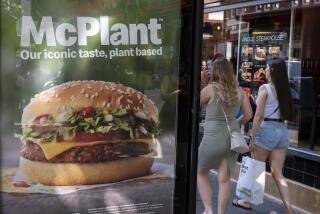Lab-grown burger from stem cells introduced: Looks good, tastes blah
- Share via
LONDON –- It looks like a hamburger, feels like one and almost tastes like one.
Scientists from the University of Maastricht in the Netherlands unveiled the first lab-produced burger on Monday, suggesting that the burgers of the future could be grown in laboratories rather than on cattle ranches.
Professor Mark Post, a physiologist from Maastricht who masterminded the project, explained to a news conference in London that his team had developed the burger from stem cells taken from cow muscle, which were then encouraged to grow and expand in the lab with added nutrients to eventually become strips of muscle. They are turned into pellets of meat and given added flavor and the appearance of meat with breadcrumbs, saffron, caramel and beet juice, Post said.
“The few cells that we take from this cow can turn into 10 tons of meat,” he added.
Although still in its early stages, Post said the hope is that today’s costly experiment could turn into tomorrow’s cost-efficient food staple to help feed a burgeoning world population.
“Cows are inefficient, they require 100 grams of vegetable protein to produce only 15 grams of edible animal protein,” he told the Guardian newspaper, explaining how artificially grown meat was more efficient, “because we have all the variables under control. We don’t need to kill the cow and it doesn’t produce any methane.”
His venture was funded with more than $300,000 from Google co-founder Sergey Brin in search of transformative and environmentally friendly projects. “Some people think this is science fiction….I actually think that’s a good thing,” said Brin in a video announcing the unveiling. “If what you’re doing is not seen by some people as science fiction, it’s probably not transformative enough.”
Cooked by restaurant chef Richard McGowan and sampled by food critics Hanni Ruetzler and Josh Schonwald, the ersatz meat was judged meaty in its texture and consistency, but a bit thin on flavor. “The bite feels like a conventional hamburger,” said Schonwald, a Chicago-based food writer. There was “an absence of fat but the mouthfeel is like meat.”
The sample burger was eaten unadorned, without the usual accompaniments of bread, ketchup, mustard or tomatoes but got a basic thumbs up from its tasters.
Ruetzler, an Austrian food scientist and writer, said “the consistency is perfect, the taste is close to meat, it’s not that juicy … but I miss the salt and pepper.”
“This is kind of an unnatural experience in that I can’t tell you over the past 20 years how many times I have had a burger without ketchup or onions or jalapenos or bacon,” Schonwald told Sky News.
The world won’t be sharing the experience for some time. The first laboratory hamburgers are not expected to hit fast food outlets for 10 years or so.
ALSO:
Syria firing missiles into civilian areas, rights group says
U.S. extends closure of diplomatic posts in Muslim world
Stoli boycott targets Russian anti-gay law -- but hits Latvian vodka
Stobart is a news assistant in The Times’ London bureau.
More to Read
Sign up for Essential California
The most important California stories and recommendations in your inbox every morning.
You may occasionally receive promotional content from the Los Angeles Times.










